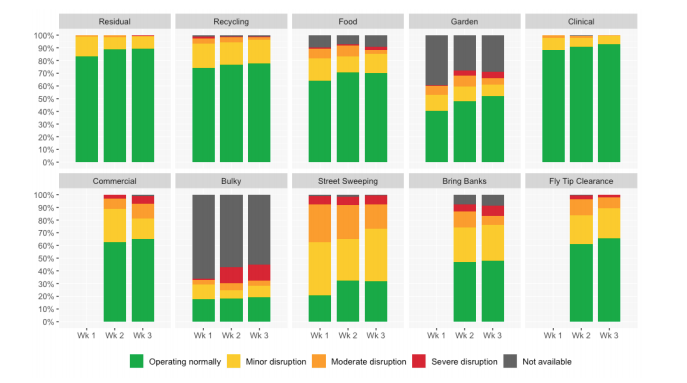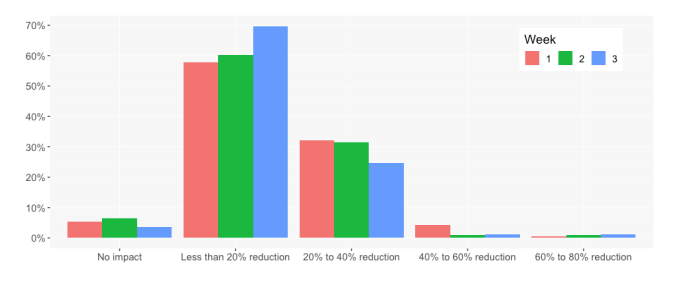Councils plan to reopen HWRCs in ‘controlled’ manner
Local authorities are planning for a “controlled and consistent” reopening of Household Waste Recycling Centres (HWRCs) once the government publishes its strategy for exiting the Covid-19 lockdown, according to the latest Association of Directors of Environment, Economy, Planning and Transport (ADEPT) local authority impact survey.
The third survey, published on Tuesday (21 April) and covering the week beginning 13 April, shows that 92 per cent of local authority HWRCs remain closed due to government advice on social distancing, an increase of two per cent from the previous survey.
The results compiled from responses from more than 250 local authorities show that residual waste and recycling collection services are slowly beginning to return to normal, while bulky waste, food waste and garden waste collections remain disrupted.
99 per cent of residual waste collections and 97 per cent of dry recycling collections are now running as normal or with only minor disruption.

Only 19 per cent of bulky waste collections are operating as normal, with 55 per cent being completely suspended and 13 per cent experiencing severe disruption.
Fly-tipping clearance is now operating normally in 66 per cent of councils, up from 61 per cent, while bring banks and street sweeping are operating as normal or with minor disruption in 76 per cent and 73 per cent of councils respectively.
HWRC debate
HWRCs have been one of the waste services hardest hit by the Covid-19 pandemic, with 90 per cent reported as closed in ADEPT’s second survey and 77 per cent in its first.
There has been great debate as to whether HWRCs should reopen again, with the Department for Environment, Food and Rural Affairs (Defra) urging councils to reopen their HWRCs amid reports of increased fly-tipping and the continued disruption to bulky waste services – just 19 per cent of bulky waste collection are operating normally, with 55 per cent suspended completely.
In the waste management sector, Veolia has called HWRCs ‘“essential” services that should be provided to residents, while SUEZ recycling and recovery UK warned that a reopening could divert resources from kerbside collection.
An additional poll carried out by SUEZ with 128 local authority representatives also found that not one of them considered HWRCs to be an ‘essential trip’ for householders during the pandemic.
Speaking on behalf of the key networks involved in the survey – the Local Authority Recycling Advisory Committee (LARAC), the Local Government Association (LGA) and the National Association of Waste Disposal Officers (NAWDO) – Ian Fielding, Chair of ADEPT’s Waste Group, said: “It is encouraging to see that local authorities are maintaining core waste services with minimal disruption and that councils are able to put resources into tackling fly-tipping. We continue to monitor the situation closely, but it still remains the case that fly tipping is undertaken by criminals and unlicensed operators who do not use HWRCs.
“Before they closed in line with essential travel guidance, centres were under immense pressure, reporting increased congestion around sites, staff being abused and social distancing difficult to maintain. We want to avoid public confusion through the piecemeal opening of HWRCs across the country, so local authorities are planning for a controlled and consistent reopening of HWRCs, managed in line with the government exit strategy when it is published.”
Staff absences and disposal
According to ADEPT’s survey, levels of staff absence remain largely below 20 per cent of the workforce, with 70 per cent of councils reporting this figure, up from 60 per cent last week, while those experiencing greater than 20 per cent of the workforce absent have fallen by seven per cent to 27 per cent.
The greatest reason for service disruption among Waste Collection Authorities (WCAs) remains staff absence due to isolation, with 39 per cent of councils citing this, followed by absence due to sickness, cited by 28 per cent of WCAs.

For Waste Disposal Authorities (WDAs), the effects of social distancing are causing the most disruption for authorities, with 31 per cent of WDAS citing this, while 25 per cent cited staff absences due to self-isolation.
Aside from HWRCs, disposal services are experiencing far less disruption than collection services. 97 per cent and 91 per cent of landfill and energy-from-waste facilities are operating as normal, while 99 per cent of Materials Recycling Facilities (MRFs) are operating as normal or with only minor disruption.
Open windrow composting continues its recovery from the first week of the ADEPT survey, with 80 per cent of facilities operating as normal this week, compared to 24 per cent in the week beginning 31 March.

Waste arisings increase
Local authorities have continued to see an increase in their waste arisings during the pandemic as the majority of people social distance and stay at home.
87 per cent of councils have experienced higher than usual residual waste arisings, up from 81 per cent last week, while 86 per cent of councils have seen increased levels of dry recycling placed out for collection.
Fly-tipping tonnages collected by councils have increased in 58 per cent of areas, while commercial waste collections have fallen in 92 per cent of local authorities as many businesses have closed their doors during the pandemic.
You can view the full ADEPT survey on the association’s website.








